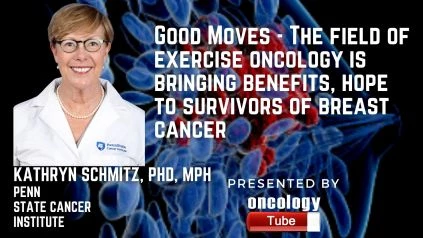Kathryn Schmitz, Ph.D., MPH, a researcher at the Penn State Cancer Institute who chaired the ACSM’s roundtables – speaks about Good Moves – The field of exercise oncology is bringing benefits, hope to survivors of breast cancer.
Link to Article:
https://hms.harvard.edu/magazine/womens-health/good-moves?utm_source=twitter&utm_medium=social&utm_campaign=hms-twitter-general
Link to Moving Through Cancer:
www.movingthoughcancer.com
As the boat glides downstream, the oars slice in and out of the water in synchrony. To the untrained eye, it appears to be just another bunch of rowers enjoying a beautiful day on the Charles River. But this all-female rowing crew has more than a passion for the sport: they are all breast cancer survivors who are united by a desire to stay healthy and active.
Regular exercise has significant impacts on both the bodies and brains of individuals with cancer, as these ladies and their counterparts in boats around the country have long known from personal experience. Science is finally catching up to them today.
Only a few decades ago, cancer patients, especially those receiving chemotherapy, were advised to rest: “Take it easy.” Strenuous activities, particularly aerobic exercise, should be avoided. The suggestion appeared reasonable at the time. Experts believe that allowing the body to rest may help it heal, but physical exertion may exacerbate fatigue, pain, and other symptoms.
This perception began to shift in the late 1980s when a pair of oncology nurses at The Ohio State University conducted a groundbreaking experiment. They randomly assigned forty-five breast cancer patients who were undergoing chemotherapy to either a group that participated in ten weeks of aerobic exercise training or a control group to determine if common knowledge on exercise avoidance held true. The results of this groundbreaking study were astounding: not only was exercise safe and practical during cancer treatment, but it was also linked to weight loss, improved body composition, and a reduction in nausea symptoms. The modest trial sparked further research, eventually resulting in the birth of a new field of study: exercise oncology.
An interdisciplinary meeting of academics and doctors was held in 2010 to evaluate the data on the safety of exercise in cancer patients. The American College of Sports Medicine (ACSM) Roundtable report that resulted, one of the first of its kind, urged cancer survivors to stay active.
The roundtable convened again eight years later to review the data, and as a result of that evaluation, the group expanded its recommendations to include the importance of exercise in cancer prevention, control, and survivorship. The recommendations provide a potent prescription for cancer patients. The evidence for these recommendations is overwhelming: studies show that regular physical exercise is linked to fewer or milder chemotherapy side effects, greater quality of life, and even decreased cancer recurrence and mortality rates. While more study is needed, experts suggest that every physician and other health care professional should consider recommending exercise to their cancer patients.

